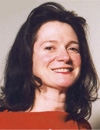Plenary Speakers
The International Health, Wellness and Society conference will feature plenary sessions by some of the world’s leading thinkers and innovators in the field, as well as numerous parallel presentations by researchers and practitioners.
Brigadier General Wilmoth
Linda Neuhauser
Gary L. Kreps
George Lambie
Garden Conversations
Plenary Speakers will make formal 30-minute presentations. They will also participate in 60-minute Garden Conversations – unstructured sessions that allow delegates a chance to meet the speakers and talk with them informally about the issues arising from their presentation.
Please return to this page for regular updates.
The Speakers
- Brigadier General Wilmoth
 Brigadier General Margaret Wilmoth, Ph.D., R.N., FAAN, has a wealth of experience in the health and wellness field. She is the first woman in history to command an Army Reserve Medical Brigade. As a professor in the school of nursing at the University of North Carolina, Chapel Hill, and the Assistant for Mobilization and Reserve Affairs at the Office of the Assistant Secretary of Defense for Health Affairs, BG Wilmoth has had many speaking opportunities to share her expertise with valued audiences. Such speaking experience includes presentations at: the Reserve Officers Association, Military Health Research Forum and Defense Education Forum. As a Legion of Merit recipient, American Academy of Nursing inductee, award winning medical researcher, published medical research author and Army Reserve General Officer, BG Wilmoth represents excellence and dedication to the health field. She looks forward to sharing the Army Reserve’s commitment to a healthy force and nation.
Brigadier General Margaret Wilmoth, Ph.D., R.N., FAAN, has a wealth of experience in the health and wellness field. She is the first woman in history to command an Army Reserve Medical Brigade. As a professor in the school of nursing at the University of North Carolina, Chapel Hill, and the Assistant for Mobilization and Reserve Affairs at the Office of the Assistant Secretary of Defense for Health Affairs, BG Wilmoth has had many speaking opportunities to share her expertise with valued audiences. Such speaking experience includes presentations at: the Reserve Officers Association, Military Health Research Forum and Defense Education Forum. As a Legion of Merit recipient, American Academy of Nursing inductee, award winning medical researcher, published medical research author and Army Reserve General Officer, BG Wilmoth represents excellence and dedication to the health field. She looks forward to sharing the Army Reserve’s commitment to a healthy force and nation.
- Linda Neuhauser
 Linda Neuhauser, DrPH, is Clinical Professor of Community Health and Human Development at the University of California, Berkeley School of Public Health. Her research, teaching and practice are focused on translating research findings into improved health interventions, including mass communication. She is especially interested in leveraging participatory approaches to improve the relevance of communication to meet the literacy, linguistic, cultural and access needs of diverse audiences. She is co-principal investigator of the UC Berkeley Health Research for Action Center that works with users to co-design and evaluate multi-media health communication resources that have now reached over 30 million households in the US and overseas. She and her group also work with heath plans and other public and private organizations on strategic planning, trainings, and communication resources to improve health literacy and clear communication. She is a member of the American Dental Association’s National Advisory Committee on Health Literacy in Dentistry. She was a participant in the US Surgeon General’s Workshop on Health Literacy and a member of the US Food and Drug Administration’s Risk Communication Advisory Committee. She was previously a US health officer in West and Central Africa. Wellness-wise, she enjoys kayaking on the California coast.
Linda Neuhauser, DrPH, is Clinical Professor of Community Health and Human Development at the University of California, Berkeley School of Public Health. Her research, teaching and practice are focused on translating research findings into improved health interventions, including mass communication. She is especially interested in leveraging participatory approaches to improve the relevance of communication to meet the literacy, linguistic, cultural and access needs of diverse audiences. She is co-principal investigator of the UC Berkeley Health Research for Action Center that works with users to co-design and evaluate multi-media health communication resources that have now reached over 30 million households in the US and overseas. She and her group also work with heath plans and other public and private organizations on strategic planning, trainings, and communication resources to improve health literacy and clear communication. She is a member of the American Dental Association’s National Advisory Committee on Health Literacy in Dentistry. She was a participant in the US Surgeon General’s Workshop on Health Literacy and a member of the US Food and Drug Administration’s Risk Communication Advisory Committee. She was previously a US health officer in West and Central Africa. Wellness-wise, she enjoys kayaking on the California coast.
- Gary L. Kreps
 Gary L. Kreps is University Distinguished Professor and Chair of the Department of Communication at George Mason University, where he directs the Center for Health and Risk Communication. His active research program, reported in more than 300 scholarly books and articles, examines the role of communication in promoting health, enhancing quality of care, and reducing health disparities. Prior to his appointment at George Mason University, he was the founding Chief of the Health Communication and Informatics Research Branch at the National Cancer Institute (NIH). He has also served as founding Dean of the School of Communication at Hofstra University, Executive Director of the Greenspun School of Communication at UNLV, and in faculty and administrative roles at Northern Illinois, Rutgers, Indiana, and Purdue Universities. Gary is the recipient of many honors including the Health Communication Centennial Scholar Award, the Outstanding Health Communication Scholar Award, the Pfizer Professorship of Clear Health Communication, the Robert Lewis Donohew Outstanding Health Communication Scholar Award, the Future of Health Technology Award, the Distinguished Achievement Award for Outstanding Contributions in Consumer Health Informatics and Online Health, and the Gerald M. Phillips Distinguished Applied Communication Scholarship Award. He is also a Fellow of the American Academy for Health Behavior.
Gary L. Kreps is University Distinguished Professor and Chair of the Department of Communication at George Mason University, where he directs the Center for Health and Risk Communication. His active research program, reported in more than 300 scholarly books and articles, examines the role of communication in promoting health, enhancing quality of care, and reducing health disparities. Prior to his appointment at George Mason University, he was the founding Chief of the Health Communication and Informatics Research Branch at the National Cancer Institute (NIH). He has also served as founding Dean of the School of Communication at Hofstra University, Executive Director of the Greenspun School of Communication at UNLV, and in faculty and administrative roles at Northern Illinois, Rutgers, Indiana, and Purdue Universities. Gary is the recipient of many honors including the Health Communication Centennial Scholar Award, the Outstanding Health Communication Scholar Award, the Pfizer Professorship of Clear Health Communication, the Robert Lewis Donohew Outstanding Health Communication Scholar Award, the Future of Health Technology Award, the Distinguished Achievement Award for Outstanding Contributions in Consumer Health Informatics and Online Health, and the Gerald M. Phillips Distinguished Applied Communication Scholarship Award. He is also a Fellow of the American Academy for Health Behavior.
- George Lambie
 George Lambie, Ph.D., is a Principal Lecturer in the Department of Public Policy at De Montfort University in the UK and Visiting Professor of the University of Havana, Cuba. Before joining the Department he was a marketing Director in industry and then a Senior Research Fellow at the University of Warwick. George teaches and researches in International Political Economy (Globalisation) and Latin American Politics. His specialist interest is the Cuban Revolution 1959-date. He has conducted research, and written on health care in Cuba and its international health aid. Most recently he undertook a field study of Cuba’s extensive programme of health co-operation with Venezuela. He has received a number of awards and prizes for his publications and conference papers, including the Frank Cass prize for the best political article in 2000, and the Very Best Paper award at an international conference (CLADEA) on business administration in 2006. His most recent article on the financial crisis (2009) has received accolades from senior politicians and financial specialists. Over the past few years he has delivered papers at a number of significant venues, including the Royal Institute of International Affairs in London, the Center for Strategic and International Studies in Washington and the Universities of Oxford and Cambridge in the UK. His most recent published book is entitled The Cuban Revolution in the 21st Century (Pluto: October 2010) and he has another book for publication in 2011 on the effect of European radical ideas on Latin American intellectuals during the interwar years. He is Co-editor of the International Journal of Cuban Studies. George’s consultancy work includes Co-directorship, with Cuba’s Minister of Finance, of the European Commission’s first major co-operation with Cuba (1996-2001). He is currently negotiating with a number of donor agencies to find support for a study of Cuban international health aid practices with a view to informing Western agencies which are currently reviewing their provision in this field. Besides his research and consultancy interests he also teaches at Undergraduate and Postgraduate levels and in June 2009 was presented with the Vice-Chancellor’s Distinguished Teaching Award. His latest educational project is to establish an international MA programme in Globalisation and Crisis based in three European Universities and with options of entry for non-European students. His leisure pursuits include growing organic fruit and vegetables, cooking and tennis.
George Lambie, Ph.D., is a Principal Lecturer in the Department of Public Policy at De Montfort University in the UK and Visiting Professor of the University of Havana, Cuba. Before joining the Department he was a marketing Director in industry and then a Senior Research Fellow at the University of Warwick. George teaches and researches in International Political Economy (Globalisation) and Latin American Politics. His specialist interest is the Cuban Revolution 1959-date. He has conducted research, and written on health care in Cuba and its international health aid. Most recently he undertook a field study of Cuba’s extensive programme of health co-operation with Venezuela. He has received a number of awards and prizes for his publications and conference papers, including the Frank Cass prize for the best political article in 2000, and the Very Best Paper award at an international conference (CLADEA) on business administration in 2006. His most recent article on the financial crisis (2009) has received accolades from senior politicians and financial specialists. Over the past few years he has delivered papers at a number of significant venues, including the Royal Institute of International Affairs in London, the Center for Strategic and International Studies in Washington and the Universities of Oxford and Cambridge in the UK. His most recent published book is entitled The Cuban Revolution in the 21st Century (Pluto: October 2010) and he has another book for publication in 2011 on the effect of European radical ideas on Latin American intellectuals during the interwar years. He is Co-editor of the International Journal of Cuban Studies. George’s consultancy work includes Co-directorship, with Cuba’s Minister of Finance, of the European Commission’s first major co-operation with Cuba (1996-2001). He is currently negotiating with a number of donor agencies to find support for a study of Cuban international health aid practices with a view to informing Western agencies which are currently reviewing their provision in this field. Besides his research and consultancy interests he also teaches at Undergraduate and Postgraduate levels and in June 2009 was presented with the Vice-Chancellor’s Distinguished Teaching Award. His latest educational project is to establish an international MA programme in Globalisation and Crisis based in three European Universities and with options of entry for non-European students. His leisure pursuits include growing organic fruit and vegetables, cooking and tennis.









